The connection between nutrition and cognitive performance has gained increasing attention over the past decade. As mental clarity, memory retention, and decision-making capabilities become top priorities for professionals, students, and older adults alike, supplements that promise enhanced brain function are surging in popularity. Among these, nootropic gummies are leading the charge, offering a convenient, tasty, and often clinically-formulated alternative to traditional capsules or powders. But are these gummies for brain health truly effective, or are they just the latest health fad packaged in a chewy form?
You may also like: How to Choose the Best Brain Supplements for Adults: Science-Backed Ingredients That Support Focus, Memory, and Mental Clarity
This article explores the science behind the best gummies for brain health and memory, investigating what makes a nootropic gummy more than just candy. Drawing upon clinical studies, expert consensus, and real-world user experiences, we examine the most promising ingredients, evaluate top formulations, and consider whether these supplements live up to their claims of cognitive enhancement. From neuroprotective vitamins to herbal adaptogens, and from attention-boosting compounds to memory-enhancing amino acids, we dissect the ingredients and their benefits, providing a grounded, trustworthy resource for anyone interested in elevating their cognitive function with the best gummies for memory and brain support.
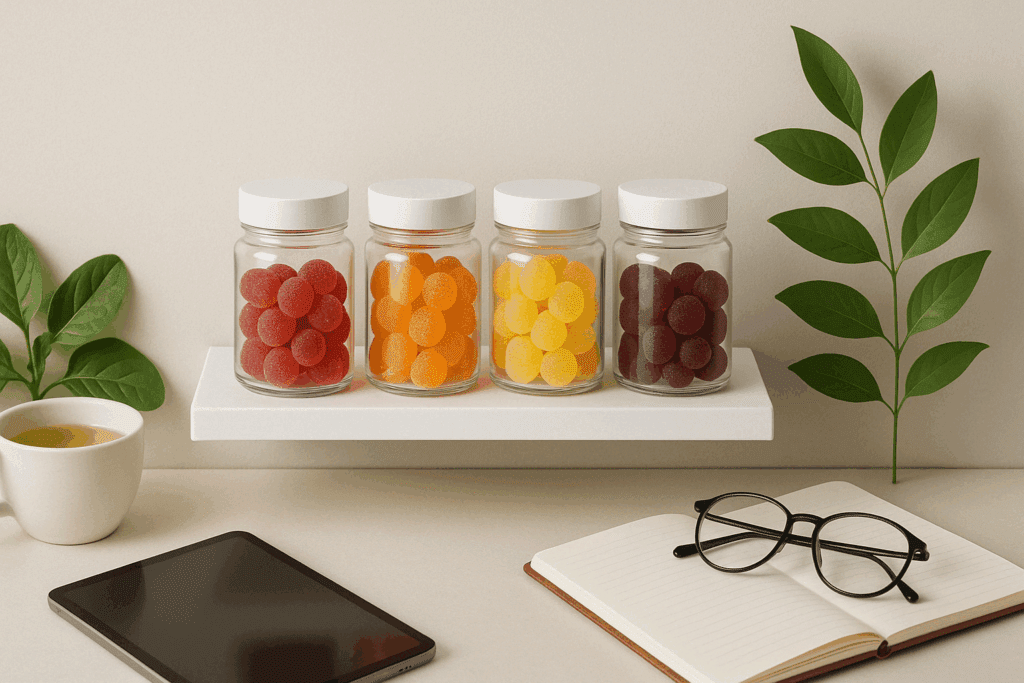
The Rise of Gummies for Brain Health in the Nootropic Market
Traditionally, cognitive enhancement products were associated with pills, tinctures, and powders, often requiring careful measurement and a willingness to tolerate unpleasant tastes. However, as consumer preferences shift toward ease of use, the supplement industry has responded with a surge in gummy-based delivery systems. These gummies, once reserved for multivitamins or children’s supplements, are now becoming vehicles for complex nootropic formulations that promise everything from mental energy to improved focus.
The appeal of gummies for brain support lies not only in their flavor but also in their palatability and compliance. Consumers are more likely to take a supplement consistently if it’s enjoyable to consume. Moreover, the psychological perception of gummies as less medicinal and more like treats helps reduce resistance in daily supplementation routines. This convenience, paired with carefully dosed active ingredients, has propelled the popularity of gummies designed specifically for cognitive clarity and memory reinforcement.
Research supports the bioavailability of certain nutrients when delivered via gummy form. For example, studies have shown that fat-soluble vitamins such as D and E may be equally or more effectively absorbed when chewed rather than swallowed in capsule form. These findings further reinforce the credibility of the best gummies for brain health as more than a novelty—they may, in fact, be an efficient and enjoyable way to nourish the mind.
Key Ingredients Found in the Best Gummies for Memory and Focus
The effectiveness of any brain supplement ultimately depends on its active compounds. The best gummies for memory and cognitive function typically incorporate ingredients backed by both traditional wisdom and modern science. Among the most common and researched components are omega-3 fatty acids, B vitamins, phosphatidylserine, bacopa monnieri, ginkgo biloba, and L-theanine.
Omega-3s, especially DHA (docosahexaenoic acid), are vital for maintaining the fluidity of cell membranes in the brain. Numerous studies have linked DHA supplementation with improved cognitive outcomes in both aging populations and younger individuals. While omega-3s are traditionally delivered via capsules or fish oil, innovative encapsulation methods have allowed their inclusion in chewable formats.
B vitamins, particularly B6, B9 (folate), and B12, play essential roles in neurotransmitter synthesis and homocysteine regulation, both of which affect brain health. Deficiencies in these vitamins have been associated with cognitive decline, making them a common feature in the best gummies for brain health. When presented in their bioactive forms, such as methylcobalamin (B12) and methylfolate (B9), they may offer superior absorption and effectiveness.
Adaptogenic herbs like bacopa monnieri and ginkgo biloba have long been used in Ayurvedic and traditional Chinese medicine for enhancing memory, learning, and cerebral circulation. Modern studies support their efficacy, especially when taken over extended periods. Bacopa, in particular, has shown promise in improving information processing speed and verbal memory.
Finally, amino acids like L-theanine, commonly found in green tea, offer calming effects without sedation. This unique characteristic allows L-theanine to promote focused attention while reducing anxiety, making it a favored ingredient in nootropic gummies designed for daily mental performance.
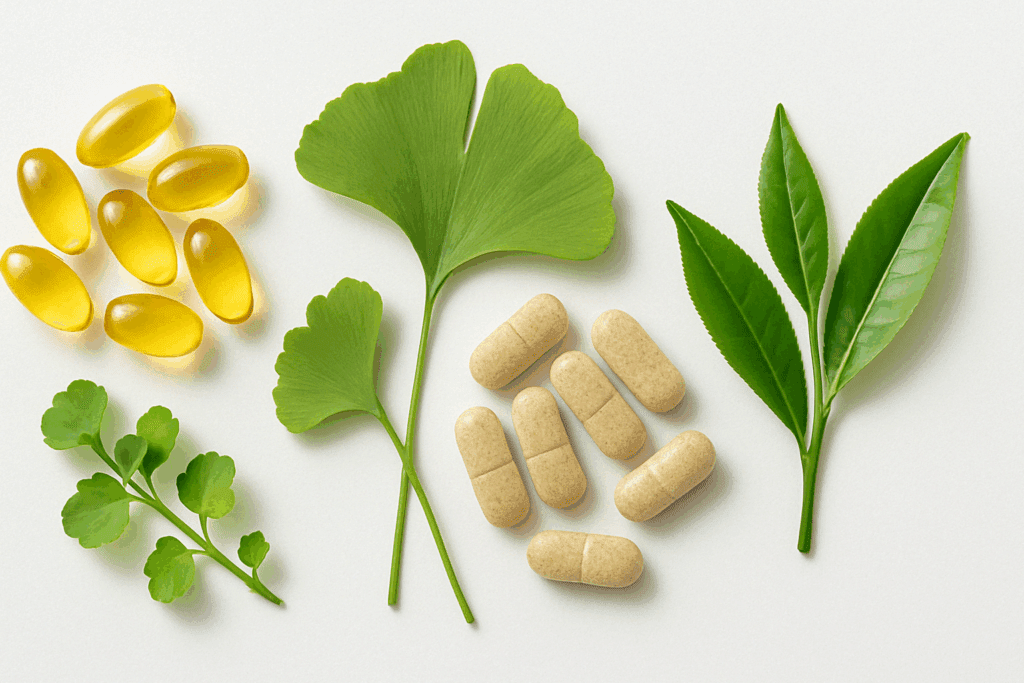
Scientific Evaluation of Nootropic Gummies: Do They Work?
To assess whether these supplements live up to their claims, we must consider the available clinical research. While individual ingredients such as ginkgo or B vitamins have been extensively studied, fewer trials have evaluated the efficacy of complete nootropic gummy formulations. Nonetheless, emerging evidence suggests that when combined strategically, these ingredients may have synergistic effects that enhance cognitive performance more effectively than when taken in isolation.
A study published in Nutrients found that a combination of B vitamins, omega-3 fatty acids, and antioxidants slowed brain atrophy in elderly individuals at risk of cognitive decline. While the study used capsules rather than gummies, the nutrient profiles are increasingly mirrored in leading nootropic gummy products. Another pilot study conducted by a nutritional neuroscience lab evaluated a multi-ingredient brain gummy on college students during exam periods and noted improvements in sustained attention, working memory, and stress resilience.
The placebo effect should also be considered. Because gummies for brain support are enjoyable to consume, users may experience enhanced mental performance due to expectation alone. While this doesn’t invalidate the results, it underscores the need for rigorous double-blind, placebo-controlled studies to separate psychological effects from physiological impact.
What is promising, however, is the alignment of many gummy-based formulations with the latest in neuroscience and nutritional research. Companies that prioritize clinically dosed ingredients, third-party testing, and transparency in sourcing are setting a higher standard. These factors lend credibility to the best gummies for memory, allowing discerning consumers to make informed decisions based on both scientific evidence and real-world outcomes.
Choosing the Best Gummies for Brain Health: What to Look For
With countless products on the market, selecting a high-quality nootropic gummy can feel overwhelming. Yet, certain criteria can help differentiate evidence-based formulations from those relying on trendy marketing. First and foremost, examine the ingredient list. Look for recognizable, research-backed compounds with doses that reflect those used in clinical studies. Transparency matters—brands that disclose exact dosages and sourcing information demonstrate a commitment to efficacy and safety.
Avoid products that use proprietary blends without indicating individual ingredient amounts. While this approach protects a company’s formula, it also obscures whether the product contains therapeutic doses of its active components. Instead, prioritize gummies with fully disclosed labels and clean ingredient lists, free of artificial dyes, excessive sugars, or unnecessary fillers.
Third-party testing and certifications from independent labs provide further assurance of quality. Reputable manufacturers often display these credentials on their websites or packaging. Look for certifications related to GMP (Good Manufacturing Practice), NSF, or USP standards, which indicate stringent quality control protocols.
Customer reviews can offer valuable insights, especially when users consistently report improved focus, memory, or mental clarity. However, testimonials should be weighed alongside clinical evidence. When both align, the likelihood of a product’s effectiveness increases. In this way, the best gummies for brain health are those that satisfy both scientific and anecdotal standards of performance.
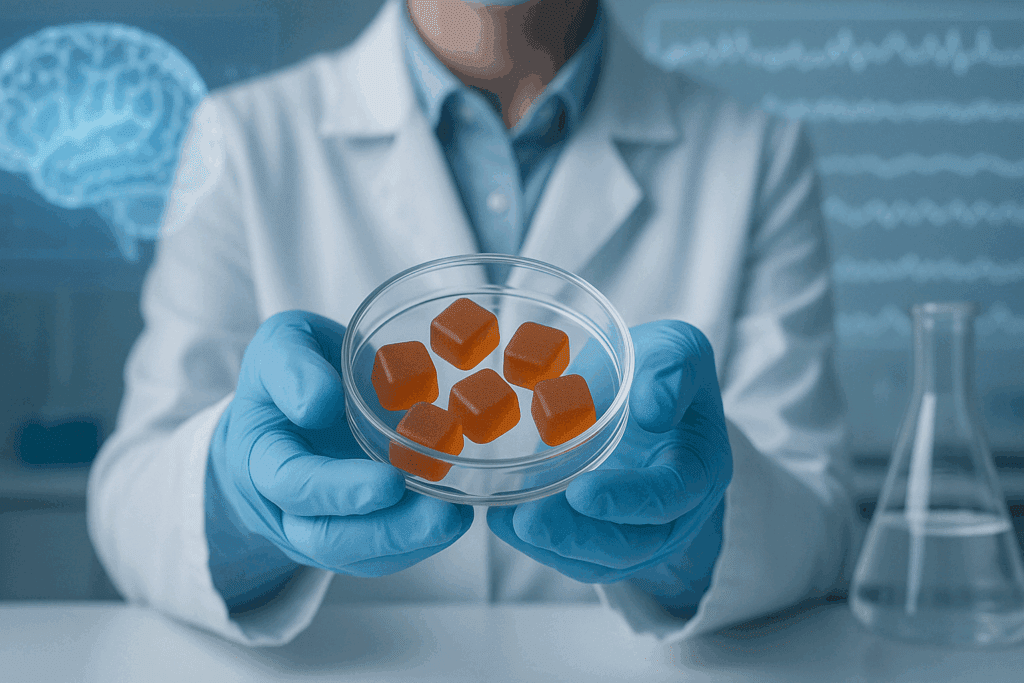
How to Incorporate Nootropic Gummies into a Cognitive Wellness Routine
Supplements, even the best gummies for brain health, should never replace foundational health practices. Instead, they work best when integrated into a broader lifestyle strategy aimed at optimizing mental performance. Consistency is key; cognitive nutrients often take time to produce measurable benefits, particularly herbs like bacopa and ginkgo, which may require 4 to 12 weeks for full effect.
Taking nootropic gummies alongside meals that contain healthy fats can aid in the absorption of fat-soluble vitamins and omega-3s. Morning consumption may be ideal for ingredients that support alertness and focus, while formulations that emphasize stress reduction may be more appropriate in the afternoon or early evening.
Hydration, sleep, physical activity, and stress management also play critical roles in cognitive function. Pairing these lifestyle factors with evidence-based supplementation creates a synergistic environment for brain health. Practices like mindfulness meditation, strategic napping, or aerobic exercise enhance neuroplasticity and cognitive resilience, making supplements even more effective.
Importantly, consult a healthcare provider before beginning any new supplement regimen, particularly if you are taking medications or managing chronic conditions. This ensures that even the best gummies for memory are used safely and effectively, tailored to individual needs and medical backgrounds.
Top Brands Offering the Best Gummies for Memory and Cognitive Clarity
Several supplement brands have emerged as leaders in the nootropic gummy space. These companies combine scientific formulation with consumer-friendly design, offering products that cater to students, professionals, and aging adults seeking to preserve mental sharpness. While brand preferences vary by individual needs, some names consistently earn praise for transparency, quality, and results.
Neuriva, a widely recognized brand, offers gummies that feature phosphatidylserine and coffee fruit extract, both linked to improved memory and focus. Clinical studies on coffee fruit have indicated increases in Brain-Derived Neurotrophic Factor (BDNF), a protein involved in learning and long-term memory. Another standout is Olly’s Ultra Strength Brain Softgels, now available in gummy form, which combines omega-3s, B vitamins, and botanical extracts in a palatable, daily format.
Goli Nutrition, best known for their apple cider vinegar gummies, has expanded into the cognitive arena with Ashwagandha-infused formulas aimed at stress reduction and focus. While not a pure nootropic, ashwagandha’s adaptogenic effects can indirectly support memory by reducing cortisol levels, which may otherwise impair cognition under chronic stress.
Mindright and Himalaya are other brands gaining traction, with formulations that blend ancient herbal traditions with modern neurobiology. These companies often include unique ingredients such as lion’s mane mushroom or amla fruit, providing broader antioxidant support and neurotrophic stimulation. Such diverse profiles contribute to the multifaceted benefits sought in the best gummies for brain health.
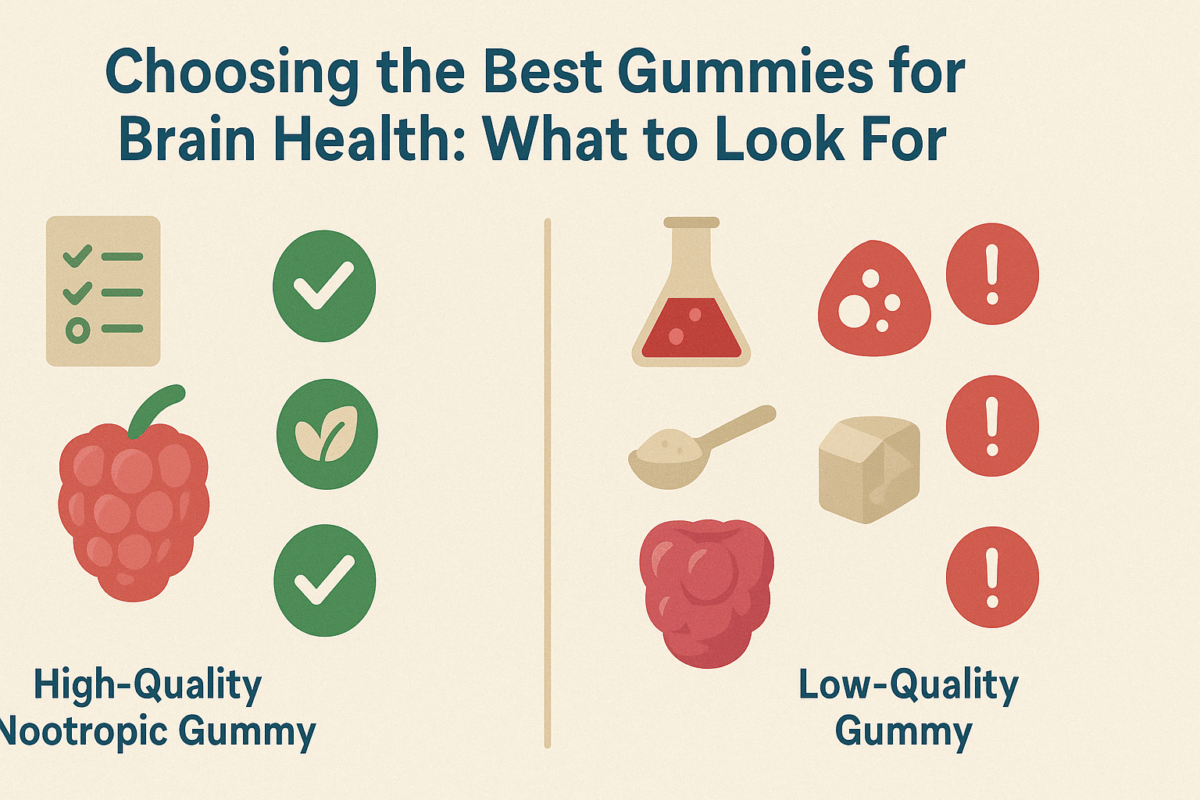
FAQ: Insights Into the Best Gummies for Brain Health and Memory
1. How do gummies for brain health compare to traditional nootropic capsules or powders?
Gummies for brain health offer a unique combination of bioavailability and compliance. Many individuals find it easier to remember and enjoy taking a flavored gummy rather than swallowing a pill or mixing a powder. While absorption can vary depending on formulation, certain brain gummies now utilize advanced delivery technologies—like liposomal encapsulation or delayed-release matrices—to enhance effectiveness. Moreover, the best gummies for brain health often integrate whole-food-based vitamins or adaptogens, which may be more appealing for health-conscious consumers seeking natural cognitive support. For those with digestive sensitivities, gummies also offer a gentler alternative to high-dose capsules that sometimes cause nausea or heartburn.
2. Can brain gummies support long-term cognitive resilience against aging?
Emerging research suggests that consistent use of the best gummies for brain health may contribute to long-term cognitive resilience. Ingredients like phosphatidylserine, bacopa monnieri, and astaxanthin—often found in high-quality brain gummies—are being studied for their potential to protect against neurodegeneration. Regular intake, especially when paired with a brain-healthy lifestyle, could offer subtle but cumulative benefits that slow memory decline over time. While they are not a cure for cognitive aging, these gummies can serve as part of a broader preventive strategy. This is especially relevant for middle-aged adults seeking proactive ways to maintain mental sharpness.
3. What are some overlooked ingredients in the best gummies for memory support?
While most people look for well-known ingredients like Ginkgo biloba or omega-3s, some lesser-known but highly promising compounds are gaining traction. Citicoline (CDP-choline), uridine monophosphate, and lion’s mane mushroom are three examples increasingly included in premium brain gummies. These ingredients not only support memory recall but may also promote synaptic plasticity and neurogenesis. Their inclusion reflects a growing trend in supplement science to move beyond stimulant-like nootropics and toward structural brain support. When reviewing product labels, consumers should look for these emerging ingredients alongside traditional ones for a more holistic memory-boosting effect.
4. Do gummies for brain work differently in men and women?
Sex-based biological differences can affect how the brain responds to various nootropics, and gummies are no exception. Hormonal fluctuations in women, for instance, may influence neurotransmitter balance, meaning certain ingredients like magnesium L-threonate or saffron extract might offer enhanced benefits during specific phases of the menstrual cycle. Meanwhile, men may respond more strongly to dopamine-regulating compounds like L-tyrosine or rhodiola. The best gummies for memory now often include gender-neutral yet adaptogenic ingredients that respond to stress and cognitive load, regardless of sex. That said, personalized supplementation could provide even better results when guided by a healthcare professional.
5. Can children or teenagers safely take brain health gummies?
Although many gummies for brain health are marketed to adults, certain child-friendly formulations are available that prioritize safety, dosage, and simplicity. Look for products specifically labeled for kids or teens, which usually contain adjusted amounts of DHA, B-vitamins, and plant-based antioxidants. These options avoid caffeine or potent herbs that may overstimulate developing nervous systems. Parents should ensure the product is third-party tested and free from artificial dyes or sugars, which can negatively impact attention in younger populations. As always, it’s essential to consult a pediatrician before starting any supplement, especially for long-term use.
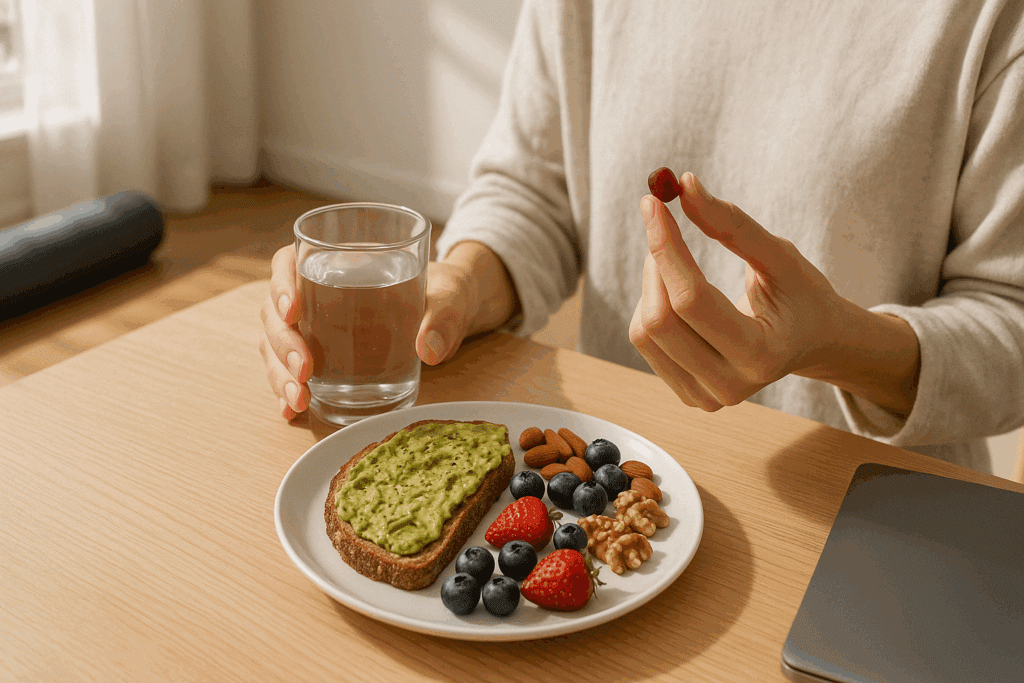
6. How can you tell if a brain gummy is working?
Effects from the best gummies for brain health are often subtle but measurable. Instead of expecting dramatic changes, users should pay attention to patterns: improved task completion, better focus during meetings, or less brain fog upon waking. A helpful strategy is to keep a cognitive log, noting changes in memory recall, mood stability, and problem-solving ability over several weeks. Some gummies also support circadian rhythms, which means better sleep and consequently enhanced daytime performance. Unlike synthetic stimulants, high-quality brain gummies typically build benefits over time, especially when taken consistently.
7. Are there interactions between brain gummies and prescription medications?
Yes, certain compounds found in even the best gummies for brain health may interact with common medications. For instance, Ginkgo biloba can affect blood clotting, and high-dose omega-3s may amplify the effects of anticoagulants. Additionally, adaptogens like ashwagandha may interact with thyroid or anxiety medications. Because brain gummies often contain blends of herbs, vitamins, and amino acids, it’s crucial to review the full ingredient list and consult with a physician or pharmacist before use. This is especially important for individuals on long-term prescriptions, as even natural compounds can exert pharmacological effects.
8. What innovations are shaping the future of brain gummies?
The future of brain supplements is being shaped by advancements in personalized nutrition, smart delivery systems, and real-time cognitive monitoring. Companies are beginning to integrate nootropic formulations into gummies using nanotechnology and liposomal carriers for improved brain penetration. Some are even exploring DNA-based customization, offering consumers brain gummies tailored to their unique genetic and neurotransmitter profiles. In addition, wearable tech is being tested to track the effectiveness of nootropics in real-time, potentially allowing users to adjust dosages based on performance feedback. These innovations could redefine what we expect from the best gummies for brain health in the next decade.
9. How do brain gummies compare with dietary changes for memory improvement?
While diet remains foundational for brain health, brain gummies can offer targeted benefits that are difficult to achieve consistently through food alone. For example, while fatty fish and leafy greens support cognitive function, most people don’t consume these daily in the required amounts. The best gummies for memory can fill nutritional gaps with clinically studied doses of compounds like acetyl-L-carnitine or vitamin B12. However, gummies should never replace a brain-friendly diet—they’re most effective when used to enhance a whole-foods-based lifestyle. Think of them as a functional booster that supports consistent, optimal intake of neuroprotective compounds.
10. Are there seasonal or lifestyle factors that affect the effectiveness of brain gummies?
Yes, environmental and lifestyle variables such as stress levels, sleep quality, and even sunlight exposure can modulate how your body responds to nootropic supplements. For instance, during winter months when vitamin D levels drop, the same dosage of brain gummies might feel less effective unless they contain D3. High-stress periods can also deplete neurotransmitters faster, increasing the demand for precursors found in the best gummies for brain health. Individuals with erratic sleep schedules may find enhanced effects when taking gummies with melatonin or L-theanine at night. Optimizing lifestyle variables alongside supplementation creates a more favorable internal environment for cognitive enhancement.

Final Thoughts: Choosing the Right Path to Mental Vitality with Gummies for Brain Health
As cognitive demands grow across all life stages, the search for safe, effective, and convenient brain-boosting solutions continues. Nootropic gummies have carved out a niche as a practical, enjoyable supplement option that appeals to a wide demographic. Their portability, pleasant taste, and increasingly science-backed formulations make them a compelling addition to modern wellness routines.
The best gummies for memory do more than sharpen short-term recall; they support broader functions like attention, mental stamina, and stress resilience. By combining clinically researched nutrients, adaptogens, and neuroprotective compounds, these products align with the latest understanding of brain health. When paired with a mindful lifestyle and personalized medical guidance, these gummies may indeed offer a sweet path to cognitive clarity.
Ultimately, while no supplement can replace a nutrient-rich diet or the benefits of physical and mental fitness, intelligently formulated nootropic gummies can serve as powerful allies. As long as expectations are grounded in science and usage is consistent, the promise of enhanced focus, memory, and mental agility becomes more attainable—one gummy at a time.
Was this article helpful? Don’t let it stop with you. Share it right now with someone who needs to see it—whether it’s a friend, a colleague, or your whole network. And if staying ahead on this topic matters to you, subscribe to this publication for the most up-to-date information. You’ll get the latest insights delivered straight to you—no searching, no missing out.
Further Reading:
Don’t buy into brain health supplements
Nootropics as Cognitive Enhancers: Types, Dosage and Side Effects of Smart Drugs


